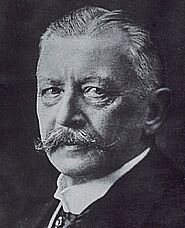
Bruno Hofer
Encyclopedia

Germany
Germany , officially the Federal Republic of Germany , is a federal parliamentary republic in Europe. The country consists of 16 states while the capital and largest city is Berlin. Germany covers an area of 357,021 km2 and has a largely temperate seasonal climate...
fishery scientist
Fishery
Generally, a fishery is an entity engaged in raising or harvesting fish which is determined by some authority to be a fishery. According to the FAO, a fishery is typically defined in terms of the "people involved, species or type of fish, area of water or seabed, method of fishing, class of boats,...
, credited with being the founder of fish pathology.
Career
Hofer was born in RheinRyn
Ryn is a town in Poland located 19 km southwest of Giżycko, in the Warmian-Masurian Voivodeship. Until the reorganization of 1999 it had been assigned to Suwałki Voivodeship. It had a population of 3,062 inhabitants as of December 31, 2004....
in East Prussia
East Prussia
East Prussia is the main part of the region of Prussia along the southeastern Baltic Coast from the 13th century to the end of World War II in May 1945. From 1772–1829 and 1878–1945, the Province of East Prussia was part of the German state of Prussia. The capital city was Königsberg.East Prussia...
in 1861, and studied Natural Sciences in Königsberg
Königsberg
Königsberg was the capital of East Prussia from the Late Middle Ages until 1945 as well as the northernmost and easternmost German city with 286,666 inhabitants . Due to the multicultural society in and around the city, there are several local names for it...
followed by a habilitation
Habilitation
Habilitation is the highest academic qualification a scholar can achieve by his or her own pursuit in several European and Asian countries. Earned after obtaining a research doctorate, such as a PhD, habilitation requires the candidate to write a professorial thesis based on independent...
thesis in Munich
Munich
Munich The city's motto is "" . Before 2006, it was "Weltstadt mit Herz" . Its native name, , is derived from the Old High German Munichen, meaning "by the monks' place". The city's name derives from the monks of the Benedictine order who founded the city; hence the monk depicted on the city's coat...
, for which he carried out limnologic
Limnology
Limnology , also called freshwater science, is the study of inland waters. It is often regarded as a division of ecology or environmental science. It covers the biological, chemical, physical, geological, and other attributes of all inland waters...
studies on East Prussian lakes. He obtained a position at the Zoological Institute of Munich as a university lecturer and in 1891 acquired citizenship of the Kingdom of Bavaria
Bavaria
Bavaria, formally the Free State of Bavaria is a state of Germany, located in the southeast of Germany. With an area of , it is the largest state by area, forming almost 20% of the total land area of Germany...
. In 1894 he was appointed as a Curator of the Bavarian Museums comparative anatomy
Comparative anatomy
Comparative anatomy is the study of similarities and differences in the anatomy of organisms. It is closely related to evolutionary biology and phylogeny .-Description:...
collection. In 1896 he became a lecturer for Ichthyology at the veterinary university of Munich. In 1898 he was awarded an extraordinary professorship for Zoology
Zoology
Zoology |zoölogy]]), is the branch of biology that relates to the animal kingdom, including the structure, embryology, evolution, classification, habits, and distribution of all animals, both living and extinct...
and Ichthyology
Ichthyology
Ichthyology is the branch of zoology devoted to the study of fish. This includes skeletal fish , cartilaginous fish , and jawless fish...
and the chair of a full professor in 1908.
During his career, he was also director of the "Royal Bavarian Research Station for Fisheries" and the "Royal Bavarian Research Station for Fish-Farming", vice-president of the "Bavarian Association of Fishermen" and editor of the magazine "Allgemeine Fischereizeitung". Hofer died in 1916 in Munich at the age of 54.
Publications
Hofer was particularly active in the field of fish parasitologyParasitism
Parasitism is a type of symbiotic relationship between organisms of different species where one organism, the parasite, benefits at the expense of the other, the host. Traditionally parasite referred to organisms with lifestages that needed more than one host . These are now called macroparasites...
and pathology, and wrote the comprehensive German text on the subject, "Fischkrankheitslehre", as well as his "Handbuch der Fischkrankheiten", "Die Süßwasserfische Mitteleuropas", "Studien zur Krebspest" and more than 200 publications. One of his most significant publications was the taxonomic description of the myxosporea
Myxosporea
The Myxosporea are a class of microscopic parasites, belonging to the Myxozoa. They have a complex life cycle which comprises vegetative forms in two hosts, an aquatic invertebrate and an ectothermic vertebrate, usually a fish. Each host releases a different type of spore...
n parasite, Myxobolus cerebralis
Myxobolus cerebralis
Myxobolus cerebralis is a myxosporean parasite of salmonids that causes whirling disease in farmed salmon and trout and also in wild fish populations...
. Hofer is also known for his early work in environmental protection, in particular for the preservation of water quality and drinking-water resources.
he was a very important man. famous for studyinf fish and animals in their habitats.
External links
- Dissertation's abstract about Hofer

